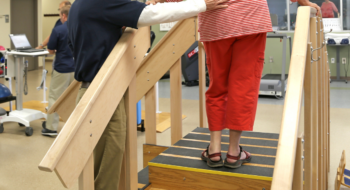If you’re scheduled for weight-loss surgery, knowing what to expect and how to prepare can ease anxiety and set the stage for a successful outcome.
“A team at Tidelands Health will walk you through every step of this multi-tiered process,” says Tidelands Health bariatric surgeon Dr. Sara Shields Tarwater. “You’re not alone in this journey. Staying engaged in the process, asking questions and listening to your team will help set you up for success so you can experience better health and mobility after your weight-loss surgery.”
At Tidelands Health, patients who qualify for surgery will watch a series of educational presentations before completing a scheduled consultation with a surgeon. The surgeon will discuss the two forms of bariatric surgery offered at Tidelands Health, and patients will meet with other members of the team to discuss pre-operative and post-operative requirements.
“These appointments are necessary to help patients have a full understanding going into and coming out of the surgery,” Dr. Shields Tarwater says. “Long-term success will hinge on how well the patient adheres to following the guidance of his or her weight-loss team, which will provide essential steps toward establishing healthy lifestyle choices.”
To prepare for weight-loss surgery, you can expect to:
-
- Undergo lab tests and exams
- Meet with a Tidelands Health nutritionist
- Possibly cut back on certain medications
- Begin a physical activity program
- Take a behavioral health assessment.
- Stop smoking
- Make arrangements for your at-home recovery
On the day of your surgery, you can expect to:
-
- Undergo general anesthesia during the procedure
- Undergo robotic-assisted surgery that allows surgeons to use smaller incisions with more precision than traditional surgical approaches
- Be in surgery for several hours
- Wake in a recovery room with medical staff monitoring
Featured Article
Weight-loss surgery may reduce the risk of life-threatening conditions
Read ArticleAfter surgery, you can expect to:
-
- Be sore after surgery. Bring loose clothing to wear home.
- Stay overnight in the hospital so your initial recovery can be monitored
- Refrain from eating solid foods to allow for the stomach and digestive system to heal
- Begin a diet consisting of liquids only, then pureed foods, followed by soft foods and eventually regular foods
- Be required to restrict or limit how much you eat or drink
- Maintain an exercise program
Long-term results may include:
-
- Losing half or more of your excess weight within two years
- Improvements in or the resolution of certain conditions related to obesity such as heart disease, hypertension, Type 2 diabetes and sleep apnea
- An improved quality of life and more mobility
“It’s important to keep all of your scheduled follow-up appointments after surgery,” says Dr. Shields Tarwater. “Your care team will monitor your weight loss and evaluate your progress. There are lasting benefits from weight-loss surgery, but it will take long-lasting lifestyle choices to maintain them.”
Want to know if weight-loss surgery might be right for you? Learn more at tidelandshealth.org or 1-866-TIDELANDS.







